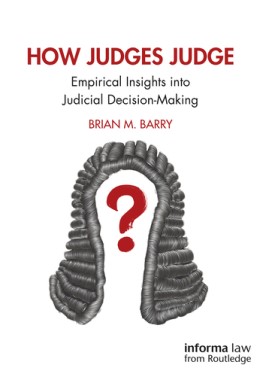
A judge’s role is to make decisions. This book is about how judges undertake this task. It is about forces on the judicial role and their consequences, about empirical research from a variety of academic disciplines that observes and verifies how factors can affect how judges judge.
On the one hand, judges decide by interpreting and applying the law, but much more affects judicial decision-making: psychological effects, group dynamics, numerical reasoning, biases, court processes, influences from political and other institutions, and technological advancement. All can have a bearing on judicial outcomes. In How Judges Judge: Insights into Judicial Decision-Making Brian Barry explores how these factors, beyond the law, affect judges in their role. Case examples, judicial rulings, judges’ own self-reflections on their role, and accounts from legal history complement this analysis to contextualise the research, make it more accessible, and enrich the reader’s understanding and appreciation of judicial decision-making.
Offering research-based insights into how judges make the decisions that can impact daily life and societies around the globe, this book will be of interest to practising and training judges, litigation lawyers, and those studying law and related disciplines.
Brian Barry graduated with an LLB from Trinity College Dublin’s School of Law in 2009 and completed his doctorate there in 2013. He qualified as a solicitor in 2015.
Brian’s main research interest is in how judges make decisions, particularly how inter-disciplinary research can inform our understanding of judicial decision-making. He also researches on judiciaries, judicial power in comparative constitutional contexts and constitutional law. He has presented extensively, and regularly appears in national media, on judges and judicial power. Brian has undertaken research programmes at both Columbia University, New York and the University of Toronto and has served in an advisory role to the Irish government on the development of workplace dispute resolution structures.